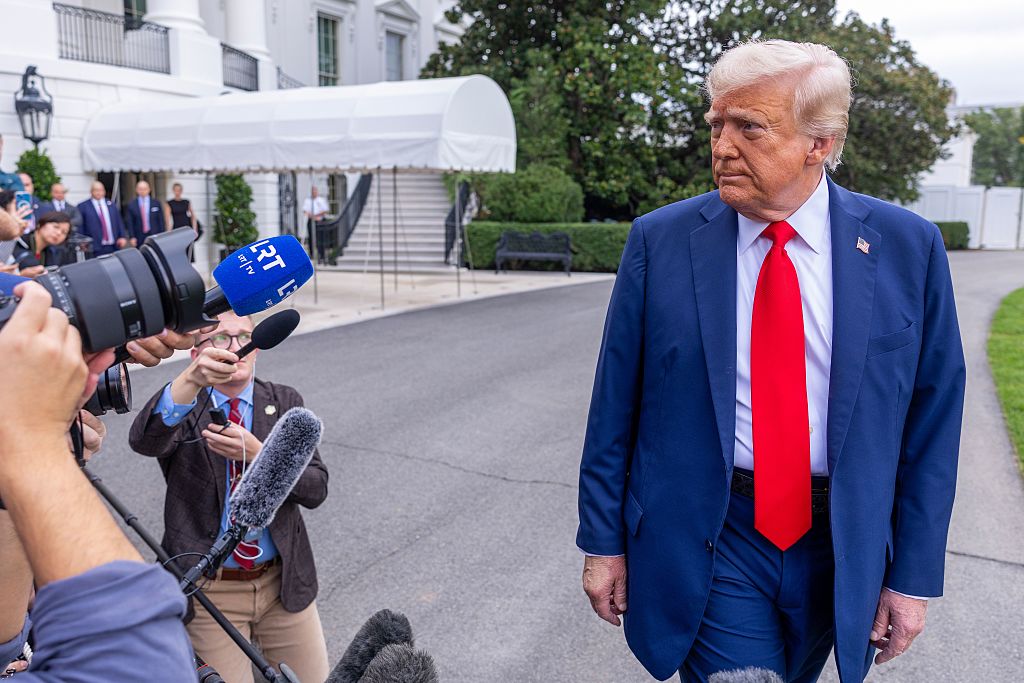In the wake of Charlie Kirk’s assassination earlier this month, President Donald Trump and members of his administration have openly discussed punishing left-leaning organizations they believe fuel political violence. Experts say one tactic that’s been mentioned could be especially harmful to some of the targeted groups: going after their tax-exempt status.
[time-brightcove not-tgx=”true”]
The charge was made most explicitly last Monday, when Vice President J.D. Vance singled out the Ford Foundation and the George Soros-funded Open Society Foundations while hosting Charlie Kirk’s podcast. “We are going to go after the NGO network that foments and facilities and engages in violence,” Vance said, referring to non-governmental organizations.
Asked about the Administration’s plans, a White House official told TIME in a statement: “The White House is exploring a wide variety of options to put pen to paper to address left-wing political violence and the network of organizations that fuel and fund it. Specifics on what that looks like continue to be discussed.”
Legal experts say the loss of tax-exempt status would amount to an existential threat to most organizations. But the White House’s ability to revoke any group’s tax-exempt status would be difficult, and could lead to protracted court battles.
For many charities, losing their tax-exempt status would be “the end of the road,” says Ofer Lion, a lawyer based in Los Angeles who is expert on non-profit tax law. It is that categorization that allows donors to deduct donations from their own taxes. The loss of their tax-exempt status would immediately hobble a group’s fundraising, as well as potentially force the organization to have to pay taxes on funds it holds in an endowment.
To get tax-exempt status, an organization has to describe itself to the Internal Revenue Service and explain its intention to further charitable, educational, scientific or religious purposes. The law already forbids a charity from supporting a listed terrorist organization and allows the IRS to suspend the tax-exempt status of a charity that is supporting or engaging in terrorist activity. If a charity believes it has had its tax-exempt status unfairly suspended, it can ask the IRS for administrative review and later can take their challenge to court.
“The typical IRS investigations are based on how the money is being used and whether the money is being used to further exempt purposes or if overall the organization is not actually operated for its exempt purposes or providing private benefits or is self dealing, or something like that,” says Roger Colinvaux, professor of law at The Catholic University of America. IRS investigations, he adds, are not usually “targeted toward an organization’s viewpoint and really viewpoint shouldn’t come into it at all.”
Trump has shown an increasing willingness to use the power of the Federal government to police speech. On Wednesday, ABC suspended Jimmy Kimmel’s late-night show hours after Federal Communications Commission Chairman Brendan Carr had complained on a podcast about comments Kimmel made related to Kirk’s shooting. Carr has influence over local stations’ broadcast licenses, as well as a merger being sought by the owners of some ABC affiliate stations. “We can do this the easy way,” Carr said, “or the hard way.”
ABC’s immediate relenting appeared to embolden Trump. As he flew back to Washington, he told reporters on Air Force One that if stations “give me only bad publicity—press—and they’re getting a license, I would think maybe their license should be taken away.”
During Vance’s stint as a podcaster last Monday, White House Deputy Chief of Staff for Policy Stephen Miller said that one of the last messages Charlie Kirk sent him was to say that the Trump administration needs a strategy to go after left-wing organizations promoting violence. “I will write those words on my heart and I will carry them out,” Miller said.
The threats coming from Vance and a top Trump official alarmed many of the country’s major philanthropies. In response, 158 philanthropic organizations published an open letter Wednesday saying that political violence has “no place in our democracy” and that organizations “should not be attacked for carrying out their missions or expressing their values in support of the communities they serve.” The letter’s signers included both the Ford Foundation and Open Society Foundations, as well as other prominent charitable organizations including the Robert Wood Johnson Foundation, the Mellon Foundation and the Bush Foundation. “Attempts to silence speech, criminalize opposing viewpoints, and misrepresent and limit charitable giving undermine our democracy and harm all Americans,” the letter stated.
There is a long history of political players improperly deploying the IRS for political purposes, says Patrick G. Eddington, a senior fellow at the Cato Institute. “The IRS has been misused repeatedly for politically motivated audits/reviews from the McCarthy era onwards,” he wrote in an email. A more recent example, Eddington said, was the Obama-era scandal over IRS audits of various Tea Party groups, with many of the groups alleging they were being unfairly singled out. The Trump administration settled a lawsuit over the IRS investigations in 2017.
Congress was concerned enough about White House involvement in IRS activities to pass a law in 1998 that explicitly prohibits “executive branch influence over taxpayer audits and other investigations.” The law makes it illegal for a President, Vice President or any employee in their offices “to request, directly or indirectly, any officer or employee of the Internal Revenue Service to conduct or terminate an audit or other investigation of any particular taxpayer with respect to the tax liability of such taxpayer.”

